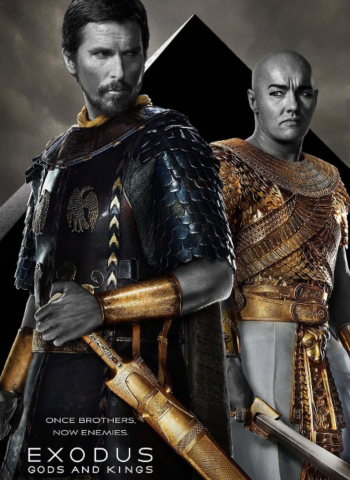Review of Exodus: Gods and Kings

Review of Exodus: Gods and Kings
I went to see the new rendition of the Exodus story in movie theatres yesterday. Director Ridley Scott takes a stab at one of the most dramatic narratives in the history of the world, the story of God electing a man to lead His people out of slavery and into a new Promised Land.
I was very excited to see this new telling of the story, and I avoided reading summaries and reviews in advance of seeing it so I could experience it with an open mind.
The movie started off with great promise. The visual representation of ancient Egypt was fantastic. The casting seemed seemed well planned. The opening battle scene, with its ominous outcome, was gripping. And Christian Bale as Moses? How could you go wrong?
Unfortunately, it did go wrong, and in a number of ways. But rather than write an exhaustive review I will just give my top 5 reasons why this movie missed the mark. Spoiler alerts ahead.
1. Moses vs. God?
The first bad omen was the skeptical attitude Moses showed toward religion in general. Scoffing at the fortune telling of Pharaoh’s soothsayer, he was the post-modern, "free-thinking”, Dawkins-reading, 2nd-year undergrad who is pretty sure religion is all bunk. I guess this was meant to make him relatable to the modern audience.
It might have been forgivable if Moses had a conversion of heart in this area, but to my viewing he remained pretty irreligious throughout the movie. Where was the great biblical character who removed his shoes in God’s presence, bowed before him and heard God’s own voice? Where was the man who received and delivered messages from God to Pharaoh?
Instead, we are given a Moses who basically argues with God and tries to accomplish as much as he can without His help. I don’t see how it can be described as anything but a contentious relationship.
2. Rambo-ses?
Remember how Moses approached Pharaoh on numerous occasions and demanded the release of the people of Israel, giving him an opportunity to respond and warning of great tribulations if he refused? Ridley Scott doesn’t. His Moses tried to lead a military insurrection against Egypt. It doesn’t work very well.
3. Why was God a kid?
For reasons I can’t understand, Scott represents God as a young boy that Moses converses with. Not a burning bush, though that makes a cameo. No, a little kid who kind of follows Moses around. But only Moses can see him. To the outsider, it looks like he may be hallucinating.
Worse, Scott’s God acts like a kid. He seems to almost like watching Moses fail. He seems at times to be revenge-driven. In these occasions, Moses represents the voice of justice and restraint and mercy, which was hard for me to swallow.
4. A Pharaoh scorned?
There is very little interaction between Moses and Pharaoh after he returns from exile. Why, I can’t say, because the actor playing Pharaoh was really good. It would have been great to see them oppose each other a bit more, a la the great interplay between Charlton Heston and Yul Brynner. Instead we’re treated to a very long silent treatment.
5. Why did God call Moses at all?
Honestly, in this account, Moses is almost irrelevant. God does not ask him to deliver warnings to Pharaoh (instead he literally says “Watch what I’m going to do”, and then does it all himself). As well, Moses doesn’t really offer any spiritual leadership to the people. How can he? He doesn’t seem to get God himself.
The straw that broke the camels back was when God parts the Red Sea. In Scott’s story, Moses gets really mad at God and throws his sword into the water. Then he takes a nap. When he wakes up, the water is lowering.
In the Bible it says this:
The LORD said to Moses, "Why do you cry to me? Tell the people of Israel to go forward.
Lift up your rod, and stretch out your hand over the sea and divide it, that the people of Israel may go on dry ground through the sea. (Exodus 14:15-16)
In the Bible God does something at this point that he does again and again; he enlists Moses’ participation in his plan to save the people.
God mysteriously chooses men to do marvelous things. He invites them to respond to his plan, and he allows them to exercise faith in their response.
How different is this than in the movie!
It is the same for us today. God saved the world in paying the debt of our sin. But he will not accomplish the evangelization of the world without our participation. He asks us to "lift up our rods” in faith and trust that he will work.
Have you responded to God in this way? Have you lifted up your rod in the New Evangelization? Here’s how you can tell: have you tried to bring others to Christ in a way that made you afraid? Have you wanted to help them cross the sea, but been afraid that God might not work?
This is evangelization, baby.
Back to the film. The weirdest thing about Exodus: Of Gods and Kings was that all of the strange liberties the director took lessened the drama of the actual account. Sometimes you can excuse a little elaboration and embellishment for dramatic effect. But this was the opposite of that. It showed supernatural events but removed much of what explained them, the spiritual context of it all. Which is really too bad.
For that reason I would say if you do go see this movie, familiarize yourself with the the amazing account right there in your Bible. You want a great script? It’s all there.
Also, you may want to buy the BluRay edition of The Ten Commandments, an epic film in the truest sense.
Maybe that one should have been in the Christmas guide...
Did you see the movie? What did you think? Let me know in the comments below.
Join the Converstation
We encourage and appreciate your comments and discussion on this site. Please remember to be charitable in disagreement. We reserve the right to remove comments that are deemed hurtful or excessively vulgar.



